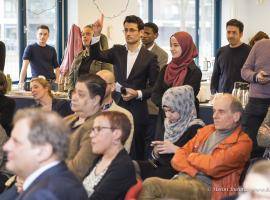Starting over begins with trust
‘We all share concerns and sadness for the future of our children’
Ghazi: “I have met many people from Overvecht with great concerns. They may be unemployed, have debt-related problems, or feel very lonely. I believe that, given the chance, these people and newcomers - refugees like myself - could really start to understand one another. We all share great concerns, recognize the feeling of sadness we have towards our children (and our desire to give them a better future) and cherish the hope of a better life. This means you have to dare to look beyond your own problems. Because it does not help to complain about the situation you are in. To complain means to stagnate.
In Overvecht, we can all learn from our own attitudes towards life. This is why it is fantastic that we are getting a chance to really meet each other there. In the Einsteindreef, I used to live together with other refugees and young people from the neighbourhood. We formed such a great bond together that, even though I have since moved house, we still get together every Sunday to share a meal. We also took free classes together in entrepreneurship and a course in English language skills with other people from Overvecht, receiving a certificate at the end to say that we had passed – something for all of us to be very proud of! I also learned that we can move mountains together, provided we are all open to opportunities that arise. My father taught me to always keep your trust in others because only then will new paths unfold for you.”
.jpg)
Picture by Godfried van Utrecht (Driefnieuws)
Elderly mother
His two-bedroom apartment nearby the Einsteindreef is still sparsely decorated. Sitting on his L-shaped couch, Ghazi pours us a glass of water, and I ask him how he ended up in Overvecht?
Ghazi:’My two sons and daugthers had fled Syria to live in Europe a few years earlier. They are all grown up and married now. I was so worried when they left! They had to travel a tremendous distance because the countries around Syria did not offer any refuge. After a very dangerous journey over land and sea, they arrived in Germany and then travelled on to Sweden. I followed them to Europe much later but my trip ended in the Netherlands. We all travelled routes that were then deemed safe, which meant that you could sometimes end up having to go to a different country.’
Ghazi told me that his decision to leave Syria was not one he had taken lightly. The reason being his unwillingness to leave his 86-year-old mother behind. However, his two sisters promised to look after her and they convinced Ghazi it was better if he lived closer to his own children. When we talk about his mother, tears roll down his face. “We call one another every day, but sometimes we skip a day because the previous call had made us feel so sad. I know that all she wants is that I have a safe and good life here. I really try my utmost to achieve this, if only to please her.’
Syrian delicacies
Ghazi used to work as a volunteer in the second-hand shop in Zeist. They asked him to work in the book department because he loves to read so much. “Working is a great way to meet people and I can also practise my Dutch, which is very important to me. As soon as I can speak it well enough, I dream of starting my own business. Like my father, I used to have my own business in Syria selling cars, but I don’t want to do that here because there are plenty of car dealerships here in the Netherlands. Maybe I can import Syrian products. Syrian cuisine is delicious and since Dutch people love to eat well, maybe I can use Syrian delicacies to form a bridge between the two countries that have become so important to me.
Text and photo: Maud Bredero



 Integration of migrants and refugees
Integration of migrants and refugees
















